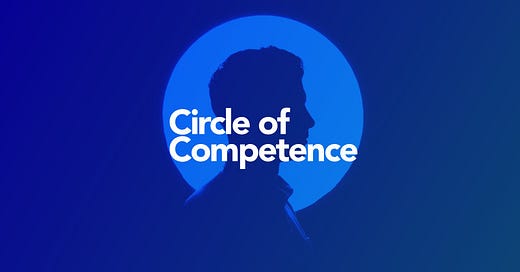Circle of Competence
Circle of competence was popularised by Warren Buffett in the world of investing but it could be applied to pretty much any aspect of life.
The idea behind this model is to focus on your strengths that you are either born with or something you have developed over the years instead of investing time and resources on trying to do anything and everything for the sake of it.
Warren Buffett doesn’t enter a business he doesn’t know about, in fact he mostly invests in businesses that he is very familiar/comfortable with.
Munger’s Thoughts on Circle of Competence
If you want to be the best tennis player in the world, you may start out trying and soon find out that it’s hopeless—that other people blow right by you. However, if you want to become the best plumbing contractor in Bemidji, that is probably doable by two-thirds of you. It takes a will. It takes the intelligence. But after a while, you’d gradually know all about the plumbing business in Bemidji and master the art. That is an attainable objective, given enough discipline. And people who could never stand in center court in a respectable tennis tournament can rise quite high in life by slowly developing a circle of competence—which results partly from what they were born with and partly from what they slowly develop through work.
Not Just Focussing on Your Strengths
Focussing on your strengths does not imply that you need to avoid exploring other areas. Instead, it is about not letting those other areas take away too much time and resources that could be better utilised on your strengths.
By developing a circle of competence, you will accumulate experience, in-depth insights and wisdom that’ll give you an almost unfair advantage over others who have a scattered approach.
Get 2-3 mental models for free, every month. Join now.
Circle of Competence at Work
If people management is your strength, you are better off focussing on doing more work in that area or applying to roles where you can thrive with this skillset.
This strategy will work for you much better than trying to become the analytics point of contact for your team even though you are neither good or interested in analytics.
And since people management comes to you naturally, you’ll clearly have an advantage over your peers who are trying to do both analytics and people management but end up doing a mediocre job at both.
Thinning Yourself Out
In our personal lives, it would help to be that person in the community who could be depended on for a particular task/skillset required for a task.
It could be something as simple as organising get-togethers if that aligns with your core skillset instead of also trying to be the MC at the party. Focussing will ensure that you are not distracted and the increases likelihood of you doing a good job.
Start thinking more rationally and make better decisions. Subscribe now.
Switching Careers
Putting all your chips on switching to a career based on skills you have not mastered is bad bet to make.
You are better off focussing your efforts on creating a thriving career that banks on your existing skillset, while giving some room to improve on your other skills without making it your focus.
TL:DR - Focus on what you are good at, work on your shortcomings on the side.
Hope this mental model brought some clarity in terms of what to focus on.
If you liked this post, respond back with a “yes”.
Thanks for reading and keep it rational.
PS: We’re hosting an AMA with Mubashar Iqbal.
If you are not already familiar with Mubashar, he was Product Hunt’t maker of the year for 2016 and has worked on 100+ indie projects.
Mubashar is a great resource for anything related to the indie hacking, Product Hunt launches, software development & selling your business etc, so start shooting your questions.


